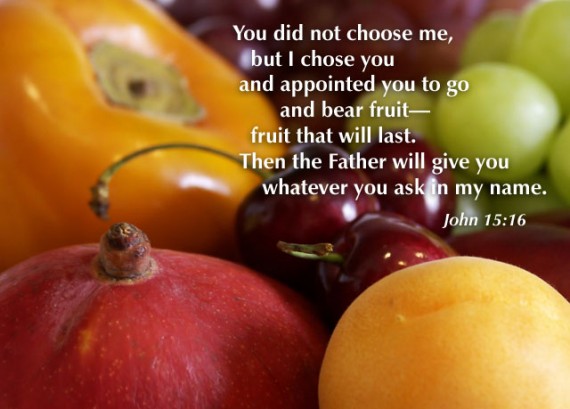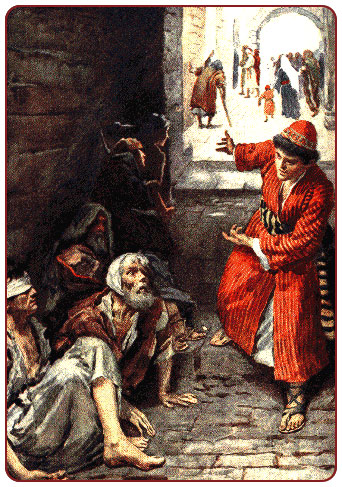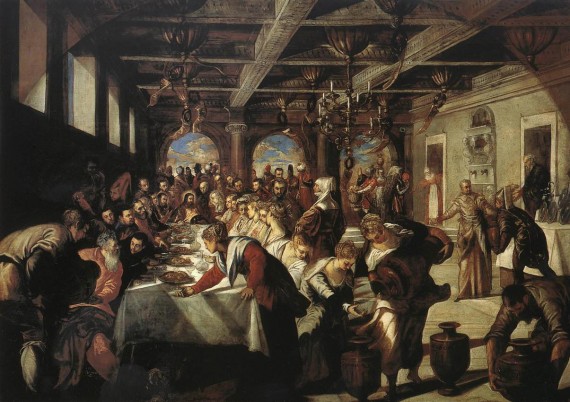In John 15:16, Jesus provides an extremely clear statement about what it means to be chosen and why certain people are chosen by God, and by Himself. Here is what He says:
You did not choose Me, but I chose you and appointed you that you should go and bear fruit, and that your fruit should remain, that whatever you ask the Father in My name He may give you (John 15:16).

Calvinists confidently claim that this text contains an irrefutable affirmation that Unconditional Election to eternal life is by God’s sovereign choice alone. On this text, Spencer writes:
The bluntest affirmation that man does not do the choosing of God, since his depraved nature is capable of being “positive” only toward Satan, is that of Jesus … (Spencer, TULIP, 41).
Palmer concurs:
Christ’s negative remark is just a forceful way of saying that although a Christian may think that he is the decisive factor in choosing Christ, the truth is that ultimately it is Christ who chose the believer. And then, after that, the believer chose Christ (Palmer, Five Points of Calvinism, 28).
While we can agree with the Calvinist that Jesus’ words are blunt and forceful about the choice that He made, we must disagree with the Calvinist that the choice Jesus is talking about is in regards to who receives eternal life.
Quite to the contrary, Jesus Himself clearly states what His choice entails. The problems in understanding this verse arise when only the first half is quoted. If we allow Jesus to finish His sentence, we see that He explains why He chose those whom He did. He chose He chose them so “that you should go and bear fruit” (John 15:16).
The sovereign choice of Jesus in John 15:16 is not a choice of some out of the mass of humanity to receive eternal life, but rather, the choice of some out of all His followers and disciples to have a deeper fellowship with Him so that they might serve Him and become more productive followers.
The choice of Jesus in John 15:16 is not to eternal life, but to service.
The Choice of Jesus in John 15:16 is to Service
That the choice of Jesus in John 15:16 is to service and not to eternal life is seen by comparing this text with the passages that actually describe the even where Jesus chose His apostles.
One of these is found in Mark 3:13-14, where we are told that Jesus chose twelve apostles “that they might be with Him and that He might send them out to preach.” Very clearly, these twelve were chosen to a specific task and purpose, which included proclaiming the gospel of Jesus Christ to the world.
This is how we can also understand Jesus’ statements to these same apostles in John 15:16. He is reminding them of the purpose for which they were chosen.
The Context of John 15:16
It is helpful as well to remember who Jesus is speaking to in John 15. This chapter is part of “The Upper Room Discourse” of John 14–16, where Jesus is speaking to the eleven remaining apostles (Judas already left, John 13:30).
The eleven apostles have many questions about what is going to happen to Jesus and what is going to happen to them, and Jesus explains over the course of these three chapters that He is going to die, but that this will enable to the Holy Spirit to arrive, so that they can continue with the work that Jesus began of advancing the Kingdom of God on earth.

So when, in John 15:16, Jesus says, “You did not choose me, but I chose you,” He is specifically speaking to His eleven apostles and reminding them that He chose them out of the wider mass of His followers for the specific task of learning from Him so that they could do the things He did (cf. John 6:70; 14:12-14; Luke 6:12-16).
This does not mean that Jesus has only chosen these eleven to do His work, for numerous other texts in the Scripture indicate that all who believe in Jesus are chosen, or elected, by Him to have a place in helping Him advance the Kingdom of God on earth.
All Believers Are Chosen to Serve
Just as Jesus chose the eleven for this task, so also, now that the Holy Spirit has come, all believers are similarly chosen. We too, like the eleven, were not chosen to receive eternal life, but, having received eternal life by faith in Jesus, we are chosen to serve God and love others.
If you want to read more about Calvinism, check out other posts in this blog series: Words of Calvinism and the Word of God.



 John 10:26 is often cited by Calvinists as a clear statement about Unconditional Election and how people do not become God’s “sheep” because they believe in Jesus; instead, they believe in Jesus because they were already God’s sheep.
John 10:26 is often cited by Calvinists as a clear statement about Unconditional Election and how people do not become God’s “sheep” because they believe in Jesus; instead, they believe in Jesus because they were already God’s sheep.
 When Jesus talks in John 10:7-10 about being the door for the sheep, He is not necessarily talking about how a person receives eternal life, but is instead talking about how a person finds protection and safety in this life, from those who wants to steal, kill, and destroy.
When Jesus talks in John 10:7-10 about being the door for the sheep, He is not necessarily talking about how a person receives eternal life, but is instead talking about how a person finds protection and safety in this life, from those who wants to steal, kill, and destroy.



 So while the reception of eternal life by faith is mentioned in this passage, the overall theme is about discipleship. To be a disciple, of course, simply means to be a student, learner, follower, or apprentice. To be a disciple means to be taught by God, which is exactly what Jesus says in John 6:45.
So while the reception of eternal life by faith is mentioned in this passage, the overall theme is about discipleship. To be a disciple, of course, simply means to be a student, learner, follower, or apprentice. To be a disciple means to be taught by God, which is exactly what Jesus says in John 6:45.
 In John 17, Jesus uses very similar language as He uses here in John 6, but in John 17, He is speaking primarily about the apostles. These twelve were chosen to receive special revelation about God through Jesus Christ (John 17:6). They belonged to God, but were given to Jesus by God (John 17:9) so that they might behold the glory of God in Jesus Christ (John 17:24). And though they were given to Him, Jesus lost none of them, except for Judas (John 17:12).
In John 17, Jesus uses very similar language as He uses here in John 6, but in John 17, He is speaking primarily about the apostles. These twelve were chosen to receive special revelation about God through Jesus Christ (John 17:6). They belonged to God, but were given to Jesus by God (John 17:9) so that they might behold the glory of God in Jesus Christ (John 17:24). And though they were given to Him, Jesus lost none of them, except for Judas (John 17:12). Calvinists often point to this text, and then make the comparison between it and passages like James 2:6 and Acts 16:19 which uses the same word for “dragging” or “compelling” people to go where they do not want to go. Some scholars also point out that the word is used in classical Greek to refer to drawing water from a well. They then point out that nobody can “woo” or “entice” water from a well; it has to be drawn up irresistibly (Sproul,
Calvinists often point to this text, and then make the comparison between it and passages like James 2:6 and Acts 16:19 which uses the same word for “dragging” or “compelling” people to go where they do not want to go. Some scholars also point out that the word is used in classical Greek to refer to drawing water from a well. They then point out that nobody can “woo” or “entice” water from a well; it has to be drawn up irresistibly (Sproul, 




 In this case, all the guests decided to stay away, and provided their token excuses, which indicated their disapproval (Malina,
In this case, all the guests decided to stay away, and provided their token excuses, which indicated their disapproval (Malina, 
